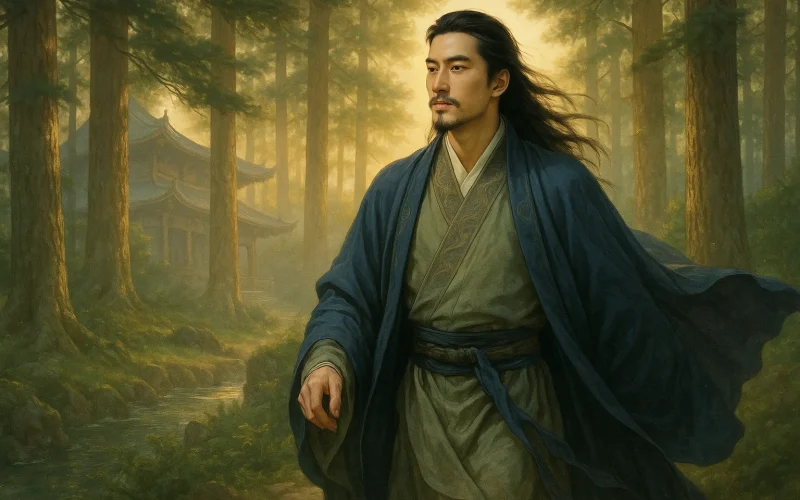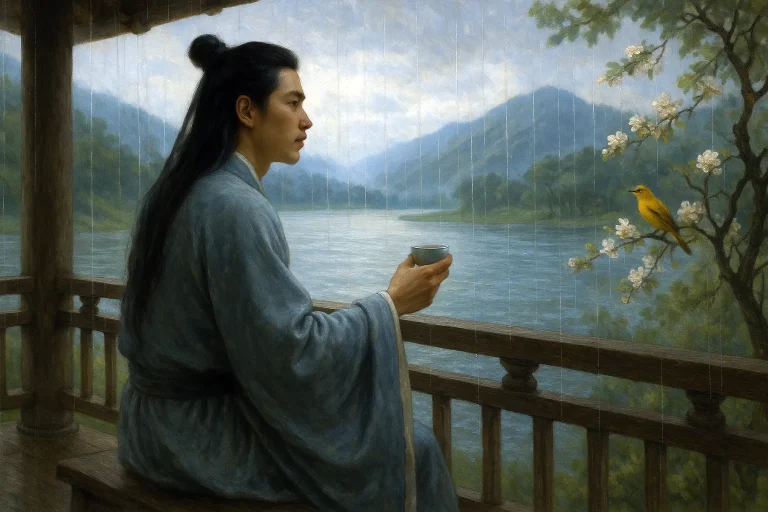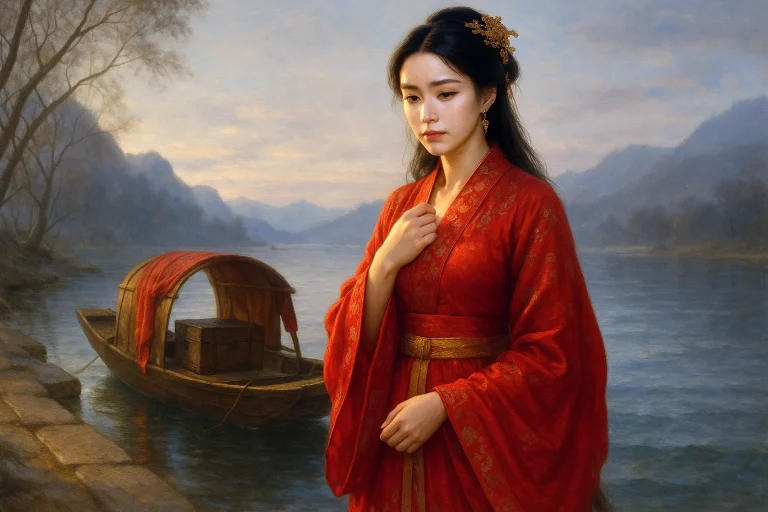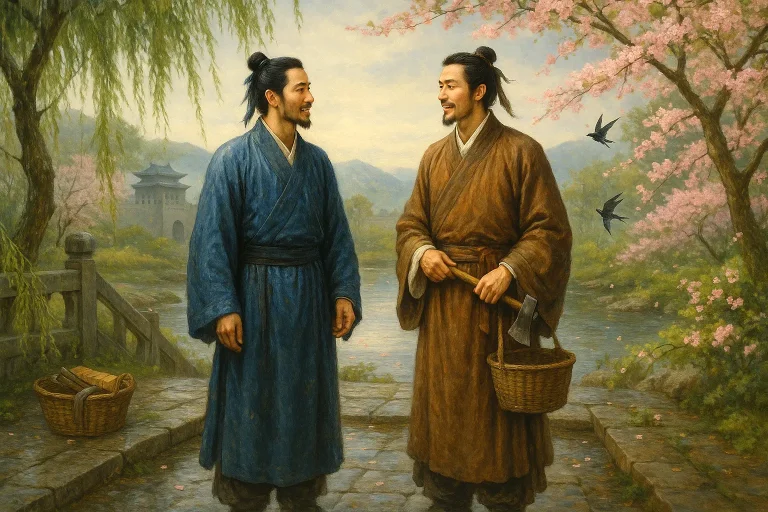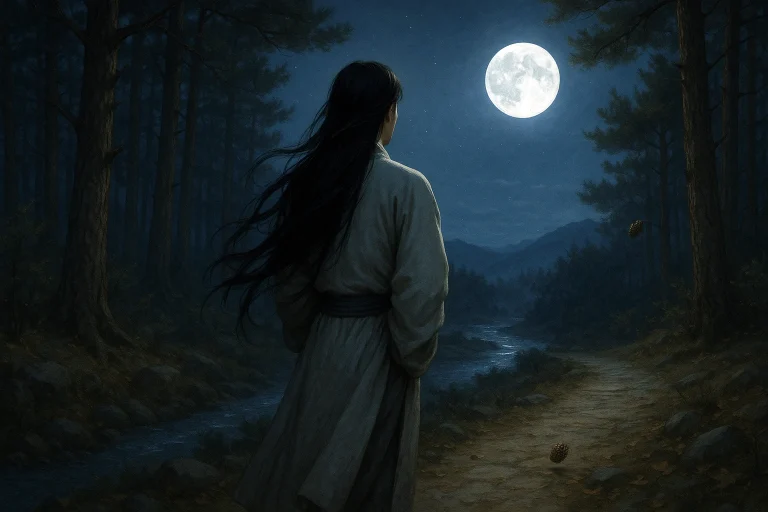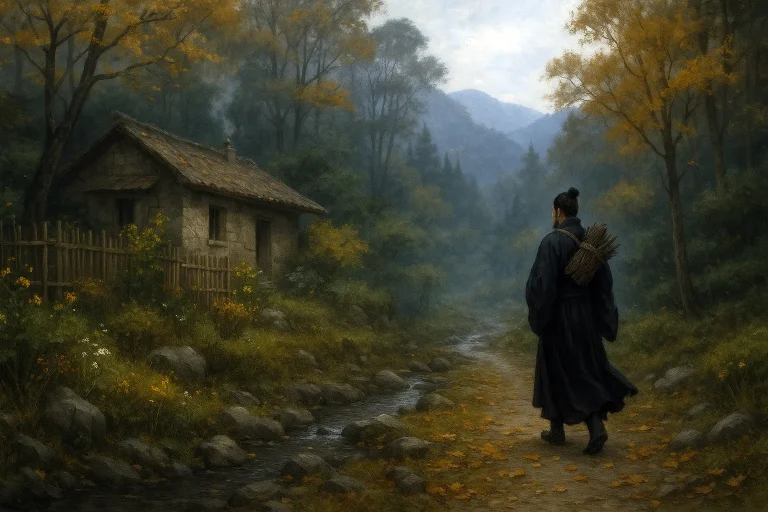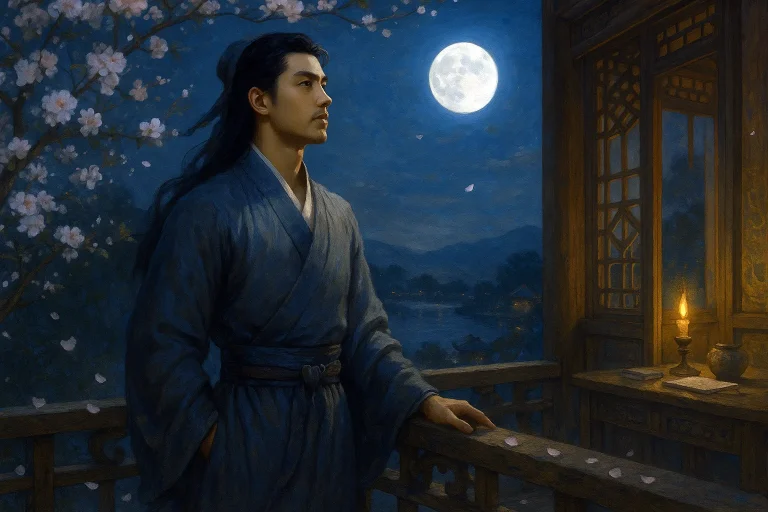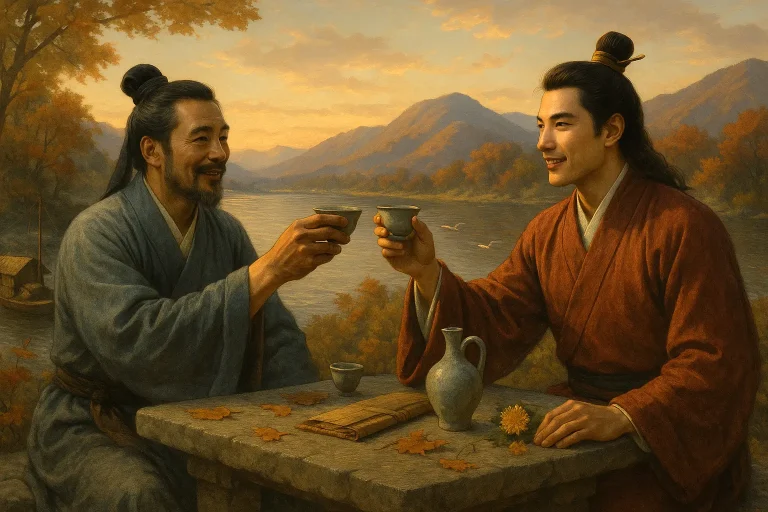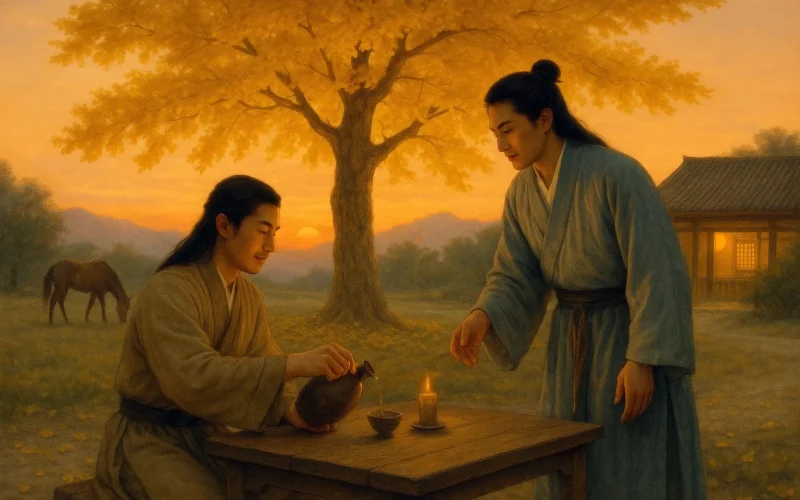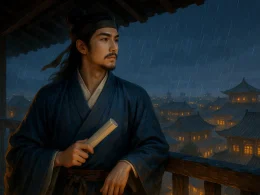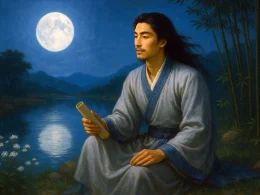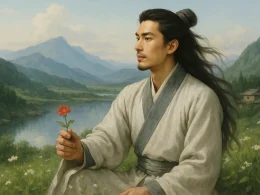Wei Yingwu was a native of Xi'an, circa 737 - 786 AD. As a young man, he served Emperor Xuanzong of the Tang Dynasty as a minister of the Three Guards, and was a chivalrous and unrestrained poet. His poems were collected in the Wei Suzhou Collection, which included concern for the people's suffering, expression of disobedience to the times and indignation, and description of idyllic scenes, etc. The language was simple and light, and the style was beautiful and clear, with the description of idyllic scenes being the most famous, which has been sung by posterity in particular.
Popular works
Main Experience
Wei Yingwu was born in Xi'an to the Wei family, which was a big family in Guanzhong, and he started his career in such a family. At the age of fifteen, he was appointed to the right thousand oxen with the title of Menyin, and became an imperial guard to Emperor Li Longji of the Tang Xuanzong. In Wei Yingwu's poems, we can see his time as a Sanwei Lang. During these days, he had escorted Emperor Tang Xuanzong to travel, hunt and feast together. These guards accompanied the emperor, his consorts, and his ministers when they were enjoying a life of luxury, and they could even share the ruler's princely life.
At that time the three guards there are a lot of Enyin noble children, these playboys into the army often rely on the family, father and brother's power, and act arbitrarily. Junior Wei Yingwu also relied on the royal grace and family power, there was a period of domineering ridiculous years.
In 755 A.D., the An Shi Rebellion broke out, and when Chang'an fell, Emperor Xuanzong of the Tang Dynasty fled to Shu, leaving Wei Yingwu unemployed. During the Qianyuan period, Wei Yingwu returned to the Imperial College and resumed his studies there, but the emperor had already become Emperor Tang Suzong, and he could no longer resume his position as one of the three guards. It was also during his studies at the Imperial College that Wei Yingwu began to study hard.
During the Guangde reign of Emperor Tang Daizong, Wei Yingwu became the county minister of Luoyang County. At this time, Luoyang was suffering from war, and the once prosperous eastern capital had become an “empty city”. During Wei Yingwu's tenure in Luoyang, warlord forces were rampant. However, Wei Yingwu was a diligent and upright county minister.
In 765 A.D., he was accused of punishing an outlawed soldier. In the middle of Yongtai, Yu was appointed as the chancellor of Luoyang to pounce on the bragging military riders. At this time, Wei Yingwu had the idea of resigning from his post and returning to his hometown.
In 768 A.D., Wei Yingwu resigned from his post after serving five years as the Minister of Luoyang. After his resignation, Wei Yingwu lived with his wife in the Tongde Jingsha (同德精舍) in Luoyang. During this period, he traveled to many places, often communicated and sang with many literati such as the “Ten Talents of Dali”, and wrote many poems.
In 771 A.D., Wei Yingwu was appointed as a military counselor of Henan Province in Luoyang. Two years later, he resigned from his post due to illness and continued to live in Luoyang's Tongde Jingsha (同德精舍).
In 774 AD, on the recommendation of Yin Ligan, Wei Yingwu went to Chang'an to serve as a Counselor of Gongcao in Jingzhao Prefecture and acted as the magistrate of Gaoling County in Jingzhao Prefecture. The magistrate of Gaoling was the magistrate of Gao Ling, a county in Beijing, and after the war, the task of supervising the corvée was very heavy. In his poems, he expressed his sympathy and intolerance for the people and his desire to return to the mountains.
In 777 A.D., his wife, with whom he had been devoted for 20 years, passed away. In his grief, he wrote many poems in memory of his wife, such as Wounded Death, Wounded Wistfulness to Fuping, and Returning from the Mountain.
In 778 A.D., Wei Yingwu became the magistrate of Shuang County (Shuangyi District, present-day Xi'an City, Shaanxi Province). Shuang County is a scenic area in the western suburb of Chang'an, with ripple pattern and other countryside resorts. In Shuang County, he had some leisure fun, but also had a lot of troubles in governing the county.
In 779 AD, Emperor Dai Zong of Tang Dynasty died and Emperor De Zong succeeded to the throne. Wei Yingwu was implicated in the crime of Ligan, the governor of Beijing, who had recommended him, and was reappointed as magistrate of Liyang County. Later, Wei Yingwu resigned from his post, claiming that he was sick, and stayed in the Western suburb of Chang'an, where he lived in the Seonbok Seungsaeng (善福精舍). Located on the banks of Fengshui River in the western suburbs of Chang'an, Shanfu Jingsha was a quiet residence where Wei Yingwu spent about two years of his idyllic life.
In 781 A.D., the imperial court appointed Wei Yingwu as a minister of the Bibi department of the Shangshu (尚书比部). In his poems during this period, there are many images of the moon, flowers, birds and cicadas, and the only time he could feel relaxed was when he took a break from his work to gather with friends and relatives.
In 782 A.D., Wei Yingwu became the assassin of Chuzhou City in Anhui Province. Chuzhou was a mountainous city located between the Jianghuai River and the Huaihe River, and was very depressed. At that time, Chuzhou was heavily taxed, and the poet once again expressed his longing to return to his hometown while pitying the people.
In the winter of 784 A.D., Wei Yingwu was dismissed from his post as the assassin of Chuzhou, and later lived in Xijian, Chuzhou.
In 785 A.D., Wei Yingwu was appointed as the assassin of Jiujiang City in Jiangxi Province. At that time, the people of Jiangzhou suffered from a bad year, heavy taxes, and fled, and Wei Yingwu's governmental affairs were also very heavy in this post.
In 787 A.D., Wei Yingwu was transferred to the capital to serve as the left secretary. He was an important official in the province of Shangshu, but his poems do not reflect the situation during his tenure there. In the following year, Wei Yingwu was once again expatriated and became the assassin of Suzhou. Suzhou was not only affluent, but also full of talented people. In Suzhou, Wei Yingwu had poetic exchanges with Gu Shi, Meng Jiao, Qiu Dan, and Qin Shi.
In 791 A.D., Wei Yingwu was dismissed from his post as the assassin of Suzhou. However, because of Wei's honesty and integrity, he was unable to return to Chang'an due to poverty, so he stayed at the Yongding Temple outside of Suzhou. He died in Suzhou in the following year.
Throughout his life, Wei Yingwu continued to join the civil service and to go into seclusion. When he was in government, he was diligent in government affairs, good at reflection, and he was not willing to levy and collect money; however, he was also very eager to return to the mountains and forests, and he wrote a lot of poems about landscapes and expressed his desire to live in seclusion many times in his poems and writings.
Literary Achievements
Wei Yingwu was born in a special era, he experienced the An Shi Rebellion for eight years and witnessed the process of the Tang Dynasty from prosperity to decline. This was a relatively quiet period for Tang poetry, known in literary history as the Dali period. The poets of the Dali period did not have the passion and boldness of the Tang poets, and although some of their poems reflected the social reality of this turbulent era, most of them were confined to the scope of their personal lives and their own feelings. Wei Yingwu's poems, however, are outstanding and unique.
Wei Yingwu was a poet of the landscape and idyllic garden school. His landscape poems are beautiful and picturesque, with a quiet and faraway mood, and his poems are praised by later generations for their care for the country and the people, as well as his thoughts and feelings about life.
Wei Yingwu was Tao Yuanming's follower and successor. Although he was in the official position, he longed for the idyllic countryside, so he went out of the civil service time and again, and returned to his hometown again and again. Moreover, he lived in temples every time, and often exchanged songs with monks, hoping to find spiritual comfort and support from the Buddhist sect.






